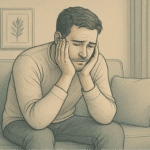
Bipolar Disorder (Manic Depression): Symptoms & Treatment
Seeking timely treatment for Bipolar Depression is crucial for managing symptoms and improving overall quality of life. Left untreated, bipolar depression can lead to worsening episodes and disruptions in daily functioning, making it harder to maintain relationships, employment, and self-care. Effective bipolar disorder treatment can significantly reduce the severity and frequency of mood swings, providing individuals with the tools they need to navigate both depressive and manic episodes. Our compassionate team offers both inpatient and outpatient treatment options, creating a tailored approach to meet each individual’s unique needs. Contact us today for more information on how we can support you in managing bipolar depression.
What is Bipolar Depression?
Bipolar Depression is a phase of Bipolar Disorder, marked by extreme mood swings between depressive and manic or hypomanic episodes. In the depressive phase, individuals experience prolonged periods of low mood, loss of interest, fatigue, and feelings of hopelessness. Managing this condition requires specialized treatment to help stabilize mood and restore emotional balance.
Symptoms of Bipolar Depression
Bipolar depression presents with a variety of challenging symptoms that can significantly impact daily life. Common symptoms of bipolar depression include intense feelings of sadness or hopelessness, often accompanied by bipolar depressive symptoms like persistent fatigue or low energy. Individuals may find it difficult to concentrate or make decisions, and they may experience changes in sleep patterns, such as insomnia or excessive sleep. Irritability or frustration is also common, along with a loss of interest in activities that were once enjoyable. In more severe cases, individuals may have suicidal thoughts or engage in self-harm. Recognizing these symptoms is crucial for seeking timely treatment and managing the condition effectively.
Symptoms of Bipolar Depression by Demographics
Bipolar depression can affect individuals differently depending on their age and life stage. In adults, the condition often manifests as prolonged periods of low mood, a lack of motivation, and difficulty functioning in work or personal responsibilities. These symptoms of bipolar depression can disrupt daily life and create challenges in maintaining relationships and fulfilling professional obligations. For teens, bipolar depressive symptoms may appear as pronounced mood swings, leading to academic struggles and a noticeable withdrawal from social activities. Teens with bipolar depression may also experience increased irritability, making it harder to navigate relationships with peers and family members. Early recognition and intervention are essential in both age groups to ensure proper treatment and support.
Causes of Bipolar Depression
Understanding what causes bipolar disorder is key to managing and treating the condition. Several factors contribute to the onset of bipolar depression. Imbalances in brain chemistry, particularly with neurotransmitters like serotonin and dopamine, can affect mood regulation, leading to depressive or manic episodes. Genetics also play a significant role; individuals with a family history of bipolar disorder are more likely to develop the condition. Additionally, life events such as trauma or highly stressful experiences can trigger bipolar episodes, especially for those predisposed to the disorder. Substance use, including alcohol or drug misuse, can exacerbate mood swings or even lead to a bipolar episode. These factors often interact, making early recognition and intervention critical for effective treatment.
Treatment for Bipolar Depression
Bipolar depression treatment is comprehensive and typically involves a combination of medication, therapy, and lifestyle modifications. Effective treatment for bipolar depression requires a personalized approach, with plans tailored to each individual’s unique needs, ensuring better management of symptoms and long-term stability.
Medication for Bipolar Depression
Managing bipolar depression often involves a combination of medications tailored to stabilize mood and alleviate symptoms. Common medications for bipolar disorder include:
- Mood stabilizers for bipolar depression such as lithium and valproate, which help regulate mood swings and prevent both depressive and manic episodes.
- Antidepressants, prescribed with caution to avoid triggering manic episodes, can help alleviate depressive symptoms when used in combination with mood stabilizers.
- Antipsychotics, often used to manage severe symptoms and psychotic features that may arise during depressive episodes.
A well-balanced medication plan is essential for long-term stability and effective management of bipolar disorder.
Therapy for Bipolar Depression
Therapy for bipolar depression is essential for managing symptoms and maintaining long-term stability. Various therapeutic approaches are used to support individuals, including:
Cognitive Behavioral Therapy (CBT), which helps individuals recognize and change negative thought patterns that may worsen depressive episodes.
Dialectical Behavior Therapy (DBT), focusing on emotional regulation, stress management, and building healthy coping mechanisms.
Family Therapy, which involves family members to improve communication and create a supportive environment for recovery.
These methods of bipolar disorder therapy are integral to creating a personalized treatment plan that addresses each individual’s unique needs and challenges.

Integrated Treatment Approaches for Bipolar Depression
Successful treatment for bipolar depression often involves an integrated treatment for bipolar disorder, combining medication with psychotherapy for optimal results. This combination therapy for bipolar depression helps individuals achieve long-term stability by addressing both the emotional and physiological aspects of the disorder.
- Medication and Therapy Combination: Using a mix of medications and psychotherapy is proven to yield the best outcomes for managing bipolar depression and maintaining mood stability.
- Lifestyle Changes: Incorporating lifestyle adjustments such as regular exercise, proper sleep hygiene, and stress management is crucial in supporting long-term recovery.
An individualized approach that combines these elements creates a comprehensive and effective treatment plan for bipolar disorder.
Our Bipolar Depression Treatment Program
At Mission Connection, our bipolar depression treatment program is designed to provide both inpatient bipolar depression treatment and outpatient bipolar depression treatment, offering flexibility and support based on each individual’s needs. Our comprehensive program is tailored to help patients regain stability in a compassionate and structured environment. With personalized care plans, we focus on creating a path to long-term recovery.
If you or a loved one is seeking effective treatment for bipolar depression, contact us today for more information about our inpatient and outpatient care options.
Inpatient vs. Outpatient Bipolar Depression Treatment Options
When considering bipolar depression treatment, it’s important to understand the differences between inpatient bipolar depression treatment and outpatient bipolar depression treatment to choose the best option for your needs.
- Inpatient Treatment: Inpatient care provides 24/7 support in a structured, residential setting. This option is ideal for individuals with severe or high-risk cases of bipolar depression, ensuring immediate access to medical and therapeutic care around the clock.
- Outpatient Treatment: Outpatient care offers more flexible options for those who need regular therapy and support but prefer to maintain their daily routines. This treatment allows individuals to attend therapy sessions while continuing with work, school, or family life.
Both treatment options are designed to support individuals in managing bipolar depression effectively. Contact us to learn more about which program is right for you.






